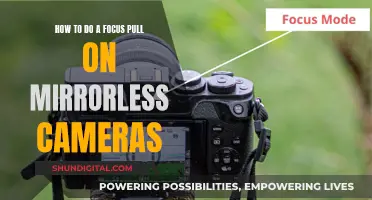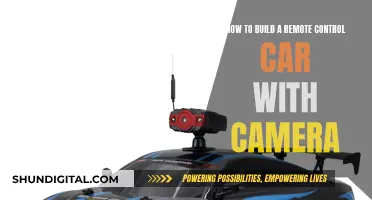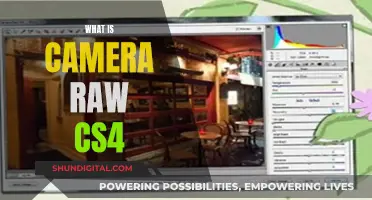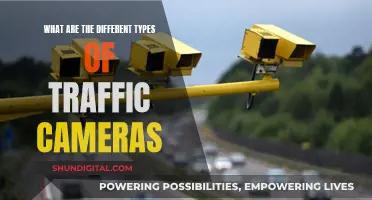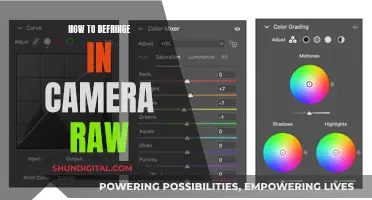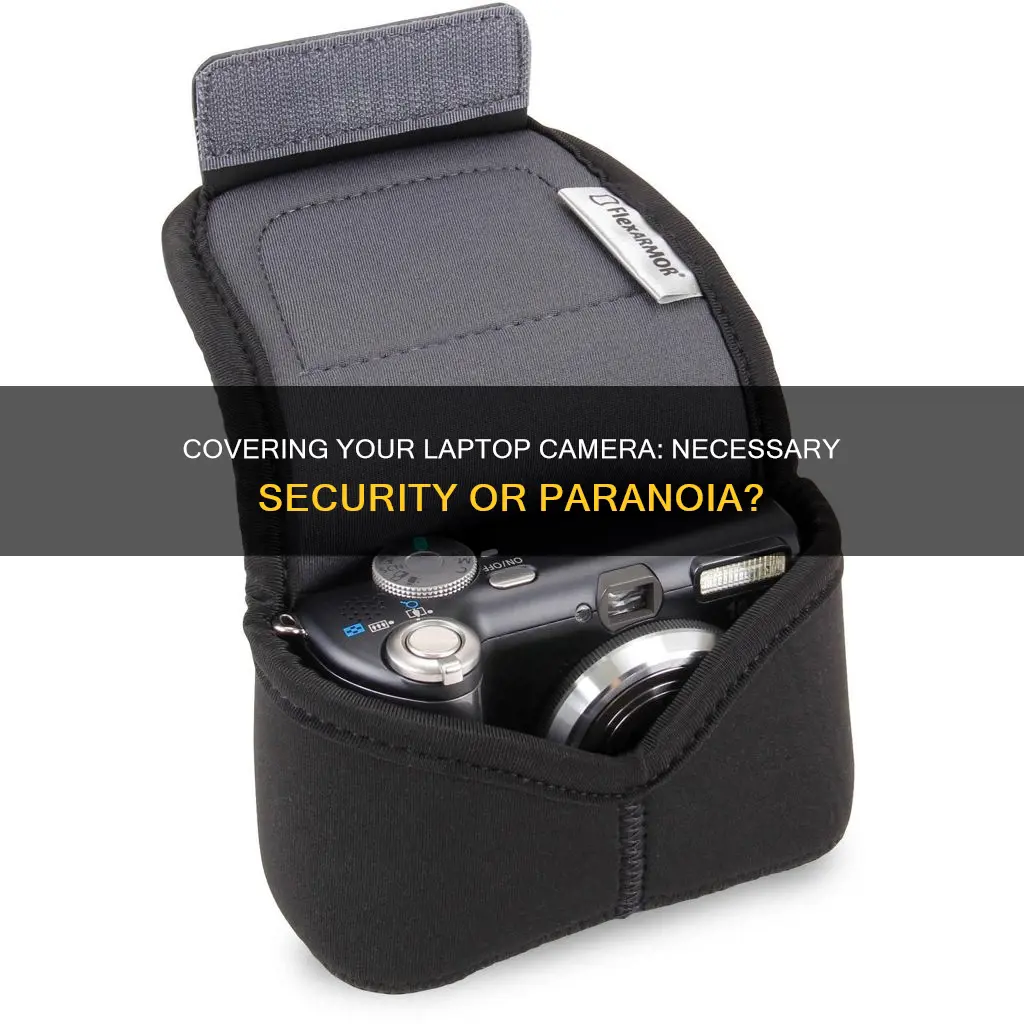
In today's tech-driven world, privacy is a growing concern. With most modern devices capable of connecting to the internet, it's no surprise that many come with built-in cameras. While these cameras are convenient for video conferencing and other activities, they can also pose a security risk. Webcam hacking, or camfecting, is a type of cyber attack where an unauthorized user accesses a device's camera without the owner's knowledge or consent. This can lead to threats such as blackmail and identity theft. While some argue that the likelihood of being hacked is low, especially if you're not a public figure, there have been numerous reports of webcam hacks over the years. So, should you be concerned about your computer's camera? And is covering it with tape or a lens cap a good idea?
| Characteristics | Values |
|---|---|
| Should I cover my computer's camera? | It is recommended by security experts and the FBI to cover your computer's camera. |
| Reasons | To prevent hacking, spying, and blackmail. |
| Who covers their camera? | Former FBI director James Comey, Facebook founder Mark Zuckerberg, and Microsoft founder Bill Gates are known to cover their webcams. |
| How to cover your camera | Use tape, a Post-It note, or a privacy sticker designed for webcams and phone cameras. |
| Other precautions | Use strong passwords, keep software updated, enable a firewall, and regularly check for malware. |
What You'll Learn

The FBI recommends covering your webcam
In 2016, FBI Director James Comey recommended that people cover their webcams with tape for security reasons. Comey's comments were made during a conference at the Center for Strategic and International Studies, where he revealed that covering webcams is a common practice at the FBI and other government offices. "It's not crazy that the FBI director cares about personal security as well," he said, adding that taking such precautions is a way for people to "take responsibility for their own safety and security."
The relative ease of hacking laptop cameras has made webcam coverage a recommended security measure. Hackers can use malware to turn on webcams and capture footage without the victim's knowledge, and this has been a growing concern for many individuals and organisations. In 2013, a US man attempted to extort nude photos of several young women, including Miss Teen USA, by hacking their webcams. This incident led to a wave of similar revelations, including the FBI's use of malware to hijack suspects' cameras and microphones.
The illicit market for compromised webcams and the footage they produce is a thriving industry. A BBC report from 2013 revealed the going price for access to a woman's webcam was $1 per girl, while computer webcams belonging to men cost $1 for one hundred. This black market for webcam access has been fuelled by the availability of inexpensive and easily accessible hacking programs and tools.
To protect against webcam hacking, individuals can take simple steps such as covering their webcams with tape or specialised privacy stickers. This practice, endorsed by the FBI, ensures that unauthorised individuals cannot access your webcam and protects your privacy and security. It is a sensible precaution that everyone should consider, especially given the prevalence of cybercrime and the potential for serious violations of personal space and data.
While some may find it ironic that the FBI is advising the public on how to avoid being spied on, the recommendation highlights the importance of individual responsibility when it comes to technology and personal security. By taking simple steps like covering your webcam, you can significantly reduce the risk of becoming a victim of cybercrime and protect your privacy.
Dash Cam Surveillance Legality: What You Need to Know
You may want to see also

Hackers can use malware to access your camera
Hackers can and do use malware to access webcams and phone cameras. This is known as "camfecting" and can leave the victim vulnerable to threats like blackmail and identity theft. Hackers can install malware and access computer, tablet, security, and Internet of Things (IoT) device cameras.
A hacker can access your camera in several ways. They may use a Remote Administration Tool (RAT) or gain access through false "remote tech support". They can also use phishing schemes, encouraging a device owner to download malicious software onto their device. If they're successful, hackers can access the device, its webcam, and private data stored on it.
A hacker can also use a Trojan virus delivered through email. This gives them internal control of a device. When a Trojan virus infects a device, it’s not just the webcam that is remotely accessed, it’s the whole computer. This means access to files, photos, banking, and a range of data.
The software that hackers use often overrides the "record" light so victims don't know they're being spied on. However, there are some warning signs that your camera may have been hacked. These include:
- The indicator light remains on even when you aren't using the camera
- New files appear on your device without your knowledge
- Background apps are using an unusual amount of data
- Your battery drains faster than usual
- Settings have changed
- The camera glitches or crashes
If you suspect that your camera has been hacked, immediately disconnect or cover your webcam and seek help from a qualified IT professional. To protect yourself from webcam hacking, consider using security software like Norton 360 Deluxe, which can help safeguard your devices against viruses, spyware, and other malware. You can also take low-tech measures such as covering your webcam with tape or a sticker when it's not in use.
The Raw Camera Filter: Where Did It Go?
You may want to see also

There's a black market for compromised webcams
There are several reasons why covering your computer camera is a good idea. Former FBI director James Comey admitted to covering his web cameras with tape, and the FBI has been able to covertly activate computers' cameras without triggering the recording light. There is also software that allows third parties to spy on computer users by hijacking their webcams and taking photos of them. This is known as Remote Access Tool (RAT) and is often spread through infected files or by tricking victims into visiting a specific webpage.
A BBC Radio 5 live investigation found sites where hackers exchanged pictures and videos of people captured on their own webcams without their knowledge. There is a black market where access to compromised computers is bought and sold for a few pence. A 16-year-old boy from London, who has hacked about 100 computers, said he did it for fun and did not worry about getting caught. A 17-year-old boy from Finland, who has hacked about 500 computers, sold the details to others so they could install their own programs and control the computers and their webcams remotely. Access to a woman's webcam can be sold for $1, while the same amount can buy access to 100 computers owned by men.
To prevent webcam hacking, it is recommended to point your webcam at a wall or cover it up, and to make sure your computer has the latest security updates and anti-virus software installed.
Blur Your Background on Video Calls: Easy Camera Tricks
You may want to see also

The FBI has hacked webcams for surveillance
The FBI has been accused of hacking webcams for surveillance. In 2013, a report by the Washington Post revealed that the agency had the ability to activate webcams for investigations, although a judge denied them permission to do so.
In 2016, FBI director James Comey recommended that people cover their webcams with tape for security reasons. Comey himself covers his webcam, and this practice is commonplace at the FBI and other government offices.
In 2010, a Pennsylvania school took thousands of privacy-violating pictures of students through the webcams on school-issued laptops. The FBI launched an investigation when a student found out that school employees had photographed him 400 times over a two-week period, sometimes when he was partially undressed or sleeping.
In 2013, a Miss Teen USA contestant, Cassidy Wolf, was photographed through her webcam by a guy in her high school. He got into her social media accounts and tried to extort money from her. It turned out that she was one of 12 girls he had taken photos of and threatened for cash. He was sentenced to 18 months in prison.
In 2014, the FBI ran its largest cyber operation to date, arresting scores of webcam hackers in over a dozen countries who had been using a program called Blackshades. The program gave its users the ability to activate victims' webcams without their knowledge.
Should I be covering my computer's camera?
The FBI's webcam hacking activities are rare, and the agency would likely need a warrant to watch you through your webcam. However, there are other malicious actors who could be watching through your webcam, and the stories of compromised cameras are genuinely terrifying. Hackers have been known to taunt people, spy on women at home, blackmail teens into sharing nude photos, and even schools have kept watch on their students.
Covering your webcam is a smart privacy and security move. Former FBI director James Comey covers his webcam, as does Mark Zuckerberg, and so do many security experts.
However, it's important to remember that webcam hacking is rare, and you should be more concerned about your personal data being hacked than your webcam. In addition to covering your webcam, it's recommended that you take other security measures such as enabling two-factor authentication, running automatic updates, turning on a firewall, backing up your data, never clicking links from strangers, and using strong passwords or a password manager.
Charging Your 360 Fly Camera: A Quick Guide
You may want to see also

Use tape or stickers to cover your camera
Covering your laptop's webcam with tape or a sticker is a simple and effective way to enhance your security and privacy. It's a measure recommended by none other than the FBI, with former director James Comey admitting to covering his web cameras with tape.
Using tape or stickers is a cheap and easy way to protect yourself from potential spying, especially if your device has been compromised by malware. It's a basic step that gives you more control over your privacy and can prevent unauthorized access to your camera.
The type of tape or sticker you use is important. Standard translucent tape may cloud the image but won't completely block it. Electrical tape is a simple option, but it will leave a sticky residue when removed. Duct tape is even stronger and will definitely leave residue. Adhesive camera covers are a better option as they are designed to be stuck on and peeled off without leaving any residue.
If you don't want to use adhesive, you can choose a non-adhesive slide cover that sticks to your device and has a lid that slides over the camera when you want to block it.
For a more decorative option, you can use stickers. Choose a fun design, such as flowers, logos, symbols, or smiley faces, ensuring the sticker is big enough to completely cover the lens. Stickers will also leave residue if removed.
While taping or sticking your camera is a good precaution, it's important to remember that it doesn't address the bigger issue of potential malware on your device. It's crucial to practice good security habits, such as being cautious with links and attachments, only installing trusted software, and regularly scanning for malware.
Selfie Mode: Why Your Camera is Stuck and How to Fix It
You may want to see also
Frequently asked questions
While it may not be necessary, it is a simple step you can take to ensure your privacy and security. Covering your camera can prevent unauthorized access and protect you from potential spying or hacking attempts.
Yes, there are a few alternative measures you can take to protect your privacy. This includes keeping your software up to date, using a firewall, regularly scanning for malware, and being cautious when clicking links in emails.
Covering your computer's camera can prevent unauthorized access and protect your privacy. It adds an extra layer of security, ensuring that even if your device is compromised, your camera cannot be accessed without your knowledge.
Not covering your computer's camera could leave you vulnerable to hacking or spying attempts. Malicious actors may be able to access your camera remotely and capture footage or images without your knowledge, which could potentially be used for blackmail or other malicious purposes.


